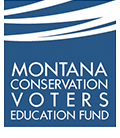Public Lands and Wildlife
We are committed to educating Montanans about ongoing conservation initiatives that align with Montana values and ensure that the Big Sky State’s iconic landscapes are protected for generations to come.
- Blackfoot Clearwater Stewardship Act: The latest survey from the University of Montana shows 85% of Montanans support BCSA – the highest level of support yet! This homegrown legislation will protect the headwaters of the storied Blackfoot River by adding nearly 80,000 acres of Wilderness to the Scapegoat, Bob Marshall, and Mission Mountains Wilderness areas. This proposed bill also promotes sustainable timber harvest and forest restoration activities and establishes two new recreation areas north of Ovando. In doing so, it will also help grow Montana’s $7.1 billion outdoor recreation economy.
- Bureau of Land Management Rulemaking: The BLM “Public Lands Rule” and “Oil and Gas Rule” are huge steps in the right direction for public lands and conservation. The “Public Lands Rule” clarifies that managing BLM land for conservation fits squarely within the agency’s legal mandate and that conservation sits on equal footing to other uses such as extraction and other commodity-driven development. The “Oil and Gas Rule” brings the public lands oil and gas leasing process into the 21st century and ensures better protections for clean air, clean water, public lands, culturally sensitive areas, and wildlife habitat.
- Great American Outdoors Act: The GAOA, passed in 2020, marked an historic investment to improve the infrastructure and address maintenance backlogs on our public lands. The GAOA has funded several projects in Montana, including on Bureau of Land Management, U.S. Forest Service, and National Park Service lands.
- State Public Lands Funding: In 2020, Team MCV helped secure passage of a ballot initiative to ensure that state parks, trails, non-game wildlife, and Habitat Montana – a popular state conservation program used to acquire more public lands, improve access, and conserve working farms and ranges in perpetuity – were funded adequately. Then, during the 2021 legislative session, we worked with partners and legislative champs to ensure that Montanans received the conservation funding they voted for on the 2020 ballot. During the 2023 Legislative Session, the agreed-upon funding structure was attacked, with anti-conservation legislators attempting to remove funding for Habitat Montana. In coalition, we fought back by passing the historic S.B. 442, a bill that brought together farmers, ranchers, county commissioners, conservationists, public lands users, veterans, and more. Despite the overwhelming bipartisan support from both delegates and everyday Montanans, the bill was eventually vetoed by Governor Gianforte. Moving forward, Team MCV won’t stop fighting to make sure that consistent, dedicated public lands funding is maintained.
- Smith River: The Smith is Montana’s only permitted river and is one of its most beloved. This remote area provides incredible habitat for fish and wildlife as well as unparalleled fishing and hunting opportunities, and it has held cultural significance for Montana’s First Peoples for millennia. The Smith River is also a lifeblood for southwest Montana, hosting important grazing lands for Montana ranchers in addition to recreational opportunities that generate $11 million annually in economic activity for the region. While only the courts can decide the outcome of what happens on private land within the Smith River drainage, the Forest Service can issue an administrative mineral withdrawal blocking expansion of proposed industrial-scale mining so that surrounding public lands can remain available for hunting, fishing, camping, and grazing, among other uses.
Energy
We are working with state and nationwide partners to promote clean energy and the good-paying jobs and energy freedom that result from it.
- Inflation Reduction Act: The IRA became law in 2022, marking the most significant action Congress has taken on clean energy in the nation’s history. Thanks to the IRA, the average household in Montana can receive $11,309 to fully electrify. Electrifying space and water heating could reduce Montanans’ energy bills across every fuel type by an average of $274 per year. If Montana were to fully electrify, $3B will have been invested in residential benefits and 18,874 total new jobs will have been generated. 428K households in Montana are eligible for an average of $5,741 in tax credits and $240 in performance rebates, and the 197K low- and moderate-income households in Montana are eligible for an average of $11,567 in electrification rebates. Click HERE to find out what tax credits you may be eligible for!
Clean Air and Water
Our mission to ensure clean air and water in Montana goes hand-in-hand with every project we support – from advocating against polluting the Smith River to fighting attacks against the Montana Constitution, which guarantees clean air and water as an inalienable right.
- Infrastructure Investment and Jobs Act: The IIJA, also known as the Bipartisan Infrastructure Law, was passed in 2021 with provisions to improve water infrastructure in more than 60 Montana communities and all Tribal Nations. Additionally, it creates jobs and provides investments to modernize our electric grid, reduce wildfire risks, and build out electric vehicle charging stations. It has also provided at least $2.82 billion in funding for improving Montana’s roads, highways and bridges. Some IIJA funding is being used to address safety and traffic concerns in Billings and the Flathead Valley. The IIJA is also funding the clean up of toxic Brownfields sites across the state, including in Billings, north-central Montana, and the Flathead Valley.
- Promise to Address Comprehensive Toxics Act: Thanks to the PACT Act, long-overdue support is being provided for veterans who’ve been exposed to toxic waste. It has allowed for over 3,800 related claims to be filed in Montana, and more than 1,700 Montana veterans have been able to enroll in VA health care as a result. It has also allowed for historic veterans infrastructure investments, such as a new, expanded VA facility in Kalispell.
Democracy
We are dedicated to upholding the values of democracy in Montana – this includes educating Montanans about their voting rights and fighting attacks on our state Constitution.
- Voting: Voting has not always been a default right for all Americans. Even now, there are many barriers to ensuring that the voices of all Americans are heard at the polls. It’s important to be informed so that your voice can be heard! Remember that YOUR VOTE, especially when combined with others in your local area, can directly influence electoral results – especially in our local and state elections. For more information, please visit mtvotersedfund.org/voting.
- The Montana Constitution: Montana’s Constitution is a special one – it safeguards our air, water, and public lands. It also faced a record number of attacks during the last legislative session. For more information, please visit mtvotersedfund.org/constitution.
The MCV Education Fund is committed to working with diverse partners and actively inviting people to our work, always striving for equity and inclusion, and learning from each other in an environment that does not perpetuate or tolerate discrimination.

